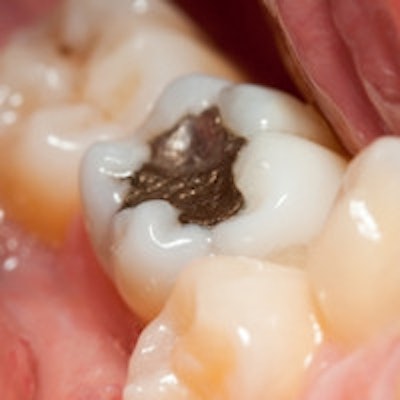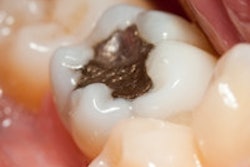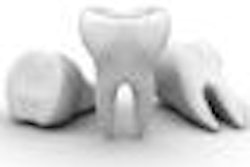
Dentistry may be one step closer to ending the drill-and-fill model. The U.K.-based company Reminova wants to naturally rebuild caries-damaged teeth and has launched a crowdfunding campaign to help bring its device to practices worldwide.
 From left to right: Chris Longbottom, BDS, PhD; Nigel Pitts, BDS, PhD; and Jeff Wright, PhD, of Reminova.
From left to right: Chris Longbottom, BDS, PhD; Nigel Pitts, BDS, PhD; and Jeff Wright, PhD, of Reminova.Reminova CEO Jeff Wright, PhD, and Chair Nigel Pitts, BDS, PhD, launched the company last year. Ideally, their new process to rebuild teeth will help to end painful injections and top-off natural tooth enamel as needed.
"We believe that with the help of and investment from crowdfunders, we can transform the treatment of tooth decay," Dr. Pitts told DrBicuspid.com in an email interview. "We can take the fear, stress, and pain out of many visits to the dentist. Our technology will help future generations keep their natural teeth cavity-free."
How it works
Reminova's technology uses a two-step electrically accelerated and enhanced remineralization (EAER) process to rebuild teeth with caries lesions. Essentially, the system involves the dentist removing damaged tissue and applying a packet of natural minerals into the cleaned area. Then, a device sends an electric current through the tooth, which drives the minerals down and allows them to harden onto the existing enamel structure, rebuilding the tooth.
“We believe that with the help of and investment from crowdfunders, we can transform the treatment of tooth decay.”
Dr. Pitts, who is also the director of the Dental Innovation and Translation Centre at Kings College London Dental Institute, came up with the idea after he was frustrated that existing caries prevention treatments and efforts were not making a significant impact. Co-founder Chris Longbottom, BDS, PhD, and Dr. Pitts decided to try electrical stimulation after realizing that normal diffusion wasn't going to make a clinical difference.
"Using small electrical charges in a novel way suddenly seemed well worth trying -- and we are glad we did as this became the EAER method!" he wrote.
Dr. Pitts tested the process on extracted teeth, and said he was "amazed that so much mineral had been redeposited deep in the tooth so quickly." This sparked the ability to commercialize the technology. The company now holds or is applying for 17 patents.
Equity crowdfunding
The next step for Reminova is to raise the funds to bring the technology into practices through an equity crowdfunding campaign. The campaign launched this week on ShareIn, a U.K.-based crowdfunding site that allows individuals to place money in a company in exchange for shares.
"We want to build a shareholder base that is motivated by the clinical effectiveness of the dental treatments, as well as the potential financial returns," Dr. Pitts wrote. "We believe we can create a supportive collaborative relationship with our crowd investors, as potential end users, customers, and partners, as well as shareholders. Equity crowdfunding is a great way for us to find individuals who believe in our game-changing technology and want to be part of our journey, by helping us fund our development."
Reminova's initial crowdfunding target for their 60-day campaign is 500,000 pounds ($781,000 U.S.), with a stretch goal of 1 million pounds ($1.56 million). The minimum investment level is 1,000 pounds ($1,560) in the U.K. and $5,000 in the U.S.
According to Dr. Pitts, the funds will be used for the following:
- Expand Reminova's development team and strengthen the commercial operations and management team
- Plan initial clinical evaluations and insurance/government reimbursement
- Develop a regulatory and clinical plan to bring products to the market
- Engineer more advanced prototypes and further develop the products and company to secure future required investment
- Explore strategic partnerships with established dental supply companies
If all goes according to plan, the dental device and consumable treatment packs will hit the market around three years from now. The device is estimated to cost less than $10,000 and the packets will retail below $10.
"The founders and our Reminova colleagues believe our EAER development work using extracted human teeth is compelling. However, the transition to comprehensive in-vivo results is our next hurdle," Dr. Pitts wrote. "We believe it is a challenging but achievable transition to migrate to work in vivo and show our treatment works where it is needed, on human teeth in the mouth."



















